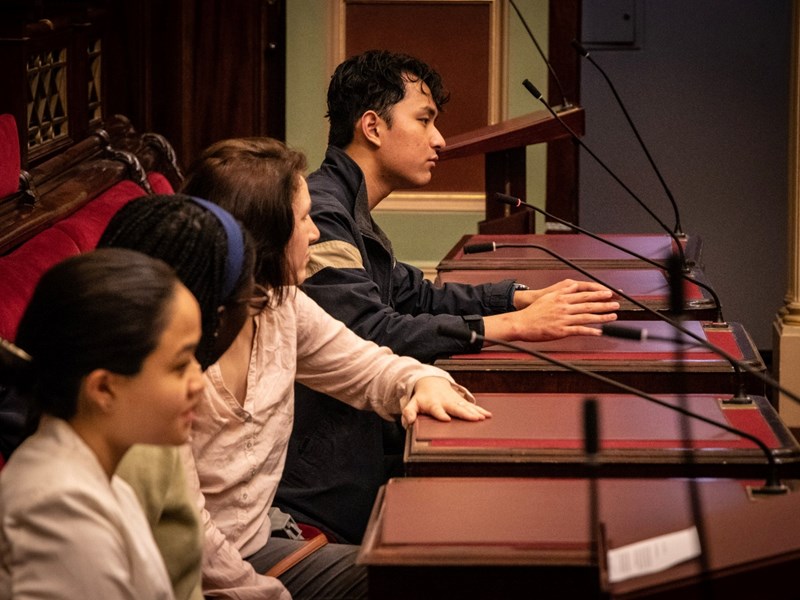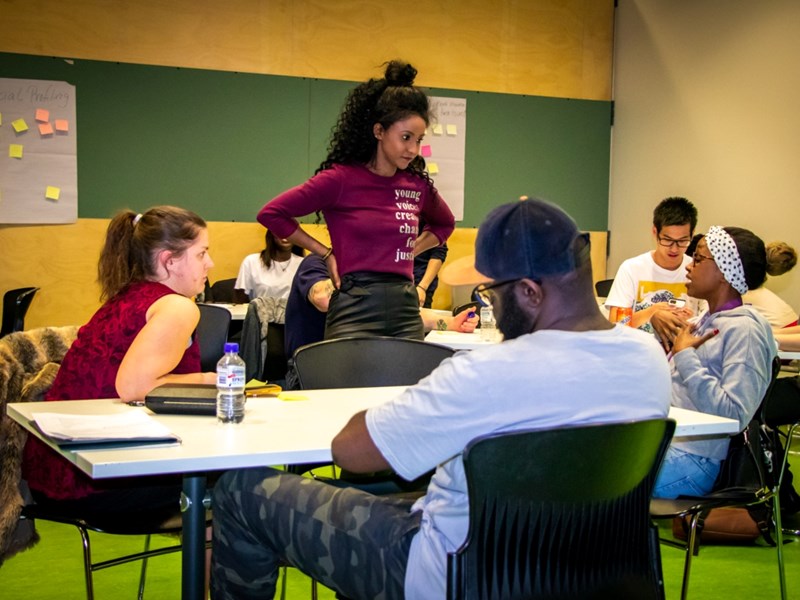- Home /
- News /
- General news
Hearing the youth voice
1 November 2022

Young people make up around a fifth of Victoria’s population, with ambitions and aspirations that MPs increasingly understand they must pay attention to.
'The onus is on MPs to listen to young people… doesn’t matter which party you are from,' says Matthew Bach, Legislative Council Member for the Eastern Metropolitan Region.
It’s a statement that reflects a growing recognition among MPs about the importance of listening to youth voices in a state where 1.2 million people are aged between 12 and 25 years.
Characterisations of disengagement and disinterest have often stigmatised young people during their journeys and endeavours as democratic citizens. But this stigma is fast becoming sidelined as parliament looks for new ways to encourage young people to get involved.
'The relationship between young people and MPs isn’t necessarily there yet,' says Member for Prahran in the Legislative Assembly, Sam Hibbins. 'It’s a real opportunity, but a real challenge as well.'
According to Hibbins, the first step is asking young people how they would like to be engaged.
'It's about how we make that first step, breaking down the gap,' he says. 'Otherwise, I’m coming up with ideas that may not resonate.'
After 20 years in parliament, retiring MP Danielle Green, the Member for Yan Yean, believes the key is to be approachable, particularly to young people.
'I remember older people saying they wanted to listen to young people, when really, in the end, they didn’t,' she recalls.
'So much has changed since I was young, but the principle is the same, they want to be heard and taken seriously,' she says of today’s youth.
Green, armed with anecdotes of past experiences, has had students from schools and universities come to her about a concern and has taken them into parliament to meet ministers. She even mentored a young boy in her constituency to create and understand a petition.
'He was about thirteen or fourteen,' she recalls. 'He wanted a skate park.'

Early adolescence into the years of young adulthood is a time of significant growth and change in a young person’s life. The ideas and concerns on policy that youth have to offer can be elevated with guidance from MPs in local electorates.
In recent times, young people’s passion and aspiration have seen advocacy and activism on issues such as climate change, mental health, LGBTQI+ rights and racial and gender equality. Yet there remain feelings of alienation and confusion about politics, a sense of being ill-equipped to take part in parliamentary processes.
Addressing these feelings is crucial for elected representatives and the institution in which they serve.
'The first step is admitting what you’re not doing, or not doing enough of,' says Matthew Bach.
There are many ways in which MPs are adapting to creating avenues for youth to be involved in their parliamentary endeavours.
Youth advisory groups are becoming more commonplace among MPs, providing a safe and open space for young people to inform, advise and make suggestions to MPs on issues and challenges youth face in their electorate.
'When young people come to me, not only do I get a lot of understanding on the issue but also a lot of enthusiasm,' Sam Hibbins says.
Internships and work experience are other important ways MPs bridge the gap with youth. They provide first-hand experience of the ins and outs of parliament and what it’s like to be a part of the everyday process from the perspective of an MP.
'I’ve had dozens and dozens of work experience youth come through my office, and numerous interns,' says Danielle Green.
'I feel I’ve learned as much from them as they’ve learned from me.'
Digital democracy is increasingly becoming a favoured avenue between MPs and their youth constituents, as most MPs are now using social media. With more and more platforms popping up, young people aged between 12 and 17 use on average four different social media services, providing lots of opportunities for interaction with youth.
'It’s the future, and it’s only going to continue to grow,' says Matthew Bach.
'It’s really helped me get the voice of young people,' Danielle Green agrees.

Facilitating user-friendly, engaging and youth-in-mind strategies on MPs’ websites and social media could help young people gain the courage and confidence to address their MP, and ask for help on an issue that means a lot to them.
Regardless of political party, the consensus among the three MPs interviewed is that ‘real world’ engagement is key to enhanced youth participation in parliament.
The MPs agree that ‘investment’ and ‘connection’ is needed in facilitating a louder, stronger, energised youth voice.
'Investing in youth is important, employing them and giving them opportunities to volunteer,' says Green.
Bach wants to see 'committees of young people' utilising some of the existing mechanisms of parliament to put their points of view forward.
Meaningful engagement and continued innovation between MPs and youth are essential for developing the future generation of parliamentarians and policymakers. As Mission Australia’s Youth Survey Report in 2021 indicated: 'It is incumbent on all of us to create welcoming environments that are responsive to the needs of all young people.'
It’s not just about inviting youth into the parliamentary conversation; it’s about involving them directly in the work of the institution. They want to help drive change and are determined to advocate for themselves as valuable assets of democracy.
'Youth have much to offer, just as we do as MPs,' concludes Matthew Bach.
About the Author

Cathryn Langley
A participant in the Parliament Express program conducted by the Parliament of Victoria in partnership with Express Media. The program provided mentoring and engagement experiences, leading to a series of articles written by young Victorians for the Victorian Parliament's website.